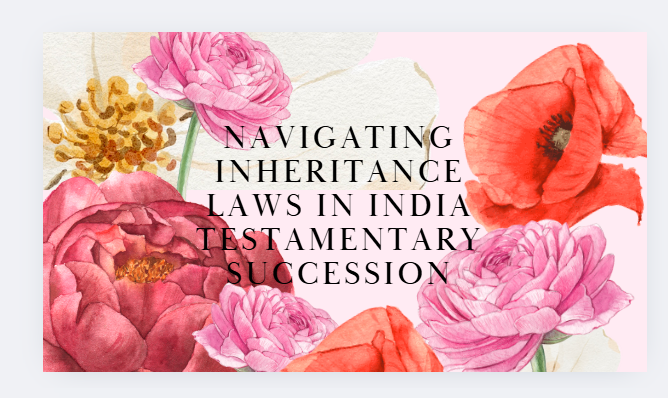K.V. Sandhya Devi, Y. Jagadishwar Kumar and Swati Bal-Tembe
INTRODUCTION
When a person dies, who inherits the rights to his estate? And what is the process by which the transfer of these rights takes place? When carefully planned by the owner of the estate, the transition after his death is generally smooth. At other times, many disputes arise, primarily between family members and with outsiders if named as beneficiaries.
What is inheritance and what are the Indian laws governing it?
Inheritance is the process of passing or transferring of properties, titles, debts, rights, and obligations to the legal heir of a person upon his/her death. It can be done either by a will or through laws of succession. A legal heir is an individual or group of individuals legally entitled to inherit the deceased person’s assets and property, either under a valid will or according to the applicable succession laws.
Succession is the determination of who is entitled to inherit the estate of the deceased.
The two types of succession as per the Indian Succession Act, 1925 (the Act) are testamentary succession and intestate succession. If the deceased in his lifetime had made a will, the transfer of the estate will follow testamentary succession. In the absence of a will, intestate succession will be determined as laid down in the Act and as per the laws of the respective religion which apply to the deceased. The Indian Succession Act applies to the wills which are made by Hindus, Sikhs, Buddhists, Jains, Christians and Parsis. The rules of succession which are applicable to Muslims are not governed by this Act. The Act also includes comprehensive provisions detailing how a will is to be made, its validity, grounds of challenge, etc.
Testamentary succession
This involves a will or testament, a legal declaration in which a person specifies how he wishes his properties to be distributed after his death. The person making the will is called a testator. The persons to whom his estate will be transferred upon his death are called the legatees or beneficiaries of the will. The movable or immovable property to be passed on to the beneficiaries through the will is called a bequest.
There are many types of wills – privileged wills (made by armed forces personnel on the war front or at sea), unprivileged wills, joint and mutual wills, conditional or contingent wills, holographic wills, etc., but we will focus mainly on the practical aspects of unprivileged wills. The Indian Succession Act defines an unprivileged will as a legal document that can be created by any individual who is not eligible to make a Privileged Will.
Let us look at the basics of a will – Who can make a will, how it is prepared and what precautions must be taken while drafting a will.
A competent person with a sound mind who is above 18 years of age may create a will. The will should be made voluntarily with no coercion or undue influence.
—————————————————————————————————-
Details involved in Creating a Valid Will
-
1. Title: The document should clearly be titled “Last Will and Testament.”
-
Details of the testator: Name, age and address of testator
-
Testator declaration: This proves that he is healthy, of sound mind, capable of making decisions, and free from any coercion or undue influence.
-
List All Assets: The first step in creating a will is to compile a comprehensive list of all your assets. This includes:
-
Immovable property (houses, flats, land)
-
Savings bank accounts and fixed deposits
-
Other deposits such as Provident fund, Public Provident fund, Senior Citizens Savings Scheme
-
Safe deposit lockers
-
Any pension that may pass on to a spouse or dependent
-
Investments in shares and mutual funds
-
Annuities
-
Insurance policies
-
Personal property (jewellery, paintings, heirlooms)
-
Vehicle titles
-
Business interests, if any
Details should include bank account numbers, policy numbers, location, address and survey numbers of immovable property, whether owned solely or jointly, etc. By listing out all the assets, the testator can ensure that all his possessions are accounted for and that the estate will be properly divided.
-
Decide on Beneficiaries: Once you have your assets listed, you need to decide who will inherit which asset and how much share in it. Beneficiaries can be individuals (family members, friends) or organizations (charities, foundations) or even a trust (See 5.3 below). It is important to clearly identify beneficiaries with their full names and addresses to avoid any confusion. By specifying who gets what, you eliminate uncertainty and reduce the likelihood of disagreements.
5.1. At times a question arises whether the testator can disinherit a close relative in the will? It is generally possible with certain exceptions, such as in case of Muslims where not more than a third of the testator’s estate can be given away to non-family members without consent of the heirs. This has been challenged in a recent case wherein P.M. Safiya, petitioned the Supreme Court seeking to be governed by the Indian Succession Act, 1925, instead of the Muslim Personal Law (Shariat) Application Act, 1937, particularly in matters of inheritance since she no longer identifies with the Muslim religion. Her contention is that the current application of Sharia law restricts her ability to bequeath her property entirely to her daughter, as it limits a Muslim’s testamentary power to one-third of the estate, with the remainder distributed among other relatives as prescribed by Sharia. [i]
In the event a testator decides to disinherit a close relative or someone financially dependent on him without giving a reason, this may be treated as a suspicious circumstance and if the will is challenged, it may affect the validity of the will. (Kavita Kanwar v. Mrs Pamela Mehta & Others).[ii]
5.2. Beneficiary and Nominee: These terms are often confused. Beneficiaries are named in the will as persons who will succeed to the estate of the deceased. Nominees are those named in bank accounts, fixed deposits, insurance policies, annuities, property documents, etc. to whom the asset will be transferred in the event of death of the account holder or property holder.
In India, it is common practice to assign a Nominee to one’s bank accounts, company shares, mutual funds, etc. Most people assume that in doing so, their accounts are protected and will automatically go to the entrusted Nominee upon their death. But that isn’t always true.
As per Indian law, a Nominee is only a trustee of an asset. Therefore, naming someone as the Nominee means that this person will only be able to hold that particular asset until the Beneficiaries are established as per the will or, in the absence of a will, the legal heirs are established as per the applicable succession laws or personal law.
Upon death of a person, the Bank or Society however is legally discharged by transferring the assets to the nominee. The nominee has the legal obligation to see that the asset goes to the rightful legal heir.
Ideally the testator can name the beneficiary for a certain asset as his nominee too. This will ensure a smooth transfer of the asset to the nominee/beneficiary on the death of the testator.
5.3 Private Trust or FamilyTrust
Instead of naming beneficiaries specifically, the testator can bequeath his estate to a trust in his will. Alternatively, he can set up a private trust while he is alive as a ‘lifetime trust’ and bequeath his estate to such trust in his will. That way, he can appoint himself as trustee during his lifetime and have better control over his assets during his lifetime.
A trust is an arrangement by which the property of the settler of the trust is transferred to a trustee for the benefit of the beneficiary. A trust can specify how assets should be distributed over time (e.g., in installments or at a certain age), so that they are useful for managing inheritances for minors or beneficiaries who may not be financially responsible.[iii]
Assets in a living trust are not considered part of the estate on the death of the testator, meaning they can often be distributed without the complications involved in a probate process. Another advantage is that trusts help to maintain privacy by not having to involve the Courts. However, trusts are more expensive and complex to set up compared to a simple will.
For small estates with straightforward assets, a will may often be a simpler and more cost-effective option.
Sometimes the two can complement each other. Having a will ensures that any assets not covered under the trust are accounted for, providing an extra layer of protection.[iv]
-
Include a residuary clause: A residuary clause in a will sets out who will inherit the remainder of the deceased’s assets once any debts, funeral expenses and taxes have been paid, and any items specifically bequeathed have been distributed to the appropriate beneficiaries.
-
Choose an Executor: An executor is to be named in the will for managing the estate, paying off debts and distributing the assets according to the wishes of the testator after his death. The executor should be a trustworthy person who will be able to take responsibility for legal and financial matters. The executor may be a beneficiary.
If the will requires a probate, it will be the executor’s responsibility to file a petition for probate.
-
Appoint a guardian: Designate a person who will act as guardian if minor children of the testator are still minors at the time of the death of the testator.
-
Have the Will Signed and Witnessed: For the will to be legally valid, the testator must sign in the presence of at least two witnesses. These witnesses should not be beneficiaries of the will. Both the testator and the witnesses must sign the will in the presence of each other. The place and date must be entered while affixing signatures.
-
Registration of a will is not mandatory. However, the process of registration helps to ensure a smoother transfer of assets and reduce potential disputes. Registration of the will can play an important role if the witnesses are either dead or are not found. It is easier to prove the will if it is registered. Registering a will helps protect against tampering or unauthorized changes. Once a will is registered, it becomes a public record, and any subsequent alterations to the registered will are closely scrutinized.
Registration of a will involves submitting the original document to a local sub-registrar office along with identity proof of the testator as well as two witnesses who are present at the time of registration. There is no requirement to pay stamp duty on a will.
-
Store the Will Safely: Once the will is signed and witnessed, store it in a safe place, such as a safe deposit locker, and inform your executor where it is kept. This ensures that the document will be easily accessible when needed.
—————————————————————————————————
After making the will
Review your estate plan regularly, especially after significant life changes, such as marriage, divorce, the death of a beneficiary, the birth of children, or acquiring new assets.
Codicil
If due to any changed circumstances, the testator would like to make alterations or additions to the will, it can be done by way of a codicil. However, a codicil is not a standalone document. It is a part of the last will of the testator.
Challenging the will
A will can be challenged by an individual who has some interest in the will. The burden of proof is on the person challenging the validity of the will. Some common grounds for challenging a will are mentioned in the Act, however these grounds are not exhaustive
Family settlement
In India, property disputes and family disputes over property are very common. Problems can arise because of the absence of a registered will or an interested party challenging the will. If these matters reach the Courts, the process is time-consuming and costly and may not always be satisfactorily resolved. Some people try to resolve their differences amicably through a family settlement arrangement, which lays down how the family members have agreed upon the distribution of property among the heirs or beneficiaries.
A family settlement deed outlines an agreement between family members to distribute and share family properties according to the terms of the settlement. Key points include identifying the family members and properties involved; specifying the distribution of each property; stating the overall terms and conditions; declaring that the settlement ends all disputes around family property; and specifying that all parties consented freely and will honour the agreement. A written and registered settlement deed needs to be stamped, but an oral family settlement does not require stamping. Even if it is not written down and registered, it is a good idea to record the main points of the oral agreement as a memory note.[v]
What is probate of a will?
Probate is a certificate from the Court of competent authority that the will has been legally and validly executed, is genuine, and is the last will of the deceased. The Court issues a certified copy of the will under the seal of the Court and gives the executor the legal authority to administer the estate. A probate does not determine title. It is not a declaration that the property is legally owned by the testator.
A probate is mandatory only if the will or codicil has been made in any of the three Presidency towns i.e., Kolkata, and the municipal limits of metro cities of Chennai and Mumbai, or, if the immovable property is situated therein. Otherwise, probate is optional. However, there is no restriction in law to get probate of a will, even if it is not mandatory.
A petition for probate is filed by the executor of the will on the death of the testator either at the place where the testator lived or where his properties are situated. If an executor is not named in the will or if the executor renounces his obligation to get probate, the beneficiary can seek probate of the will.[vi]
Conclusion
This article has discussed the importance of making a will, the manner in which it is to be drafted and the key ingredients which need to go in the will to ensure that after the death of the testator, his assets are passed on to his beneficiaries as per his wishes and with minimum dispute or challenge. The above process falls under the category of testamentary succession, i.e. succession as per the will.
Another very important facet of inheritance which requires a detailed discussion is intestate succession, i.e. how the property of the deceased passes on in the absence of a will. Some features are discussed in the Indian Succession Act, but many rules and guidelines are provided in personal laws such as the Hindu Succession Act 1956 and the Muslim personal laws. An upcoming area which needs to be addressed is how succession would apply in the case of persons who do not want to follow the faith they were born into, or who are atheists or converts.
Other important aspects connected to succession and inheritance are HUFs, ancestral properties, and separation/ division of family estates.
The laws governing inheritance vary based on religion, the presence of a will, and the nature of property. Thus, navigating inheritance law in India and its implementation can be overwhelming due to the country’s diverse religious and cultural setting.
References:
[i] Mohanty SK, “Muslim Woman Seeks Succession Law” The New Indian Express (January 29, 2025) < https://www.newindianexpress.com/nation/2025/Jan/29/muslim-woman-seeks-succession-law > accessed February 18, 2025
[ii] Arora R, “The Arduous Task of Proving a Will: The Supreme Court’s Judgment on ‘Suspicious Circumstances’” Bar and Bench – Indian Legal news (June 1, 2020) < https://www.barandbench.com/columns/the-arduous-task-of-proving-a-will-in-court-supreme-court-on-suspicious-circumstances > accessed February 21, 2025
[iii] Abhi25031997, “Transfer of Property Through Trust” (TaxGuru Consultancy & Online Publication LLP, January 22, 2020) < https://taxguru.in/corporate-law/transfer-property-trust.html > and < https://www.indiacode.nic.in/bitstream/123456789/2327/3/A1882-02.pdf >
[iv] mint, “Will vs Trust: Which One Is Right for My Estate?” mint (February 11, 2025) < https://www.livemint.com/money/personal-finance/estate-planning-family-future-inheritance-will-family-trusts-succession-planning-power-of-attorney-business-protection-11739259032301.html > accessed February 21, 2025
[v] Banerji O, “Drafting of a Family Settlement Deed: An Insight” (iPleaders, June 16, 2021) < https://blog.ipleaders.in/drafting-family-settlement-deed-insight/ > and “Is-a-Family-Settlement-Required-to-Be-Stamped” < https://supremetoday.ai/issue/Is-a-family-settlement-required-to-be-stamped > accessed February 21, 2025
[vi] Acharya M, “Probate Of A Will” ClearTax (January 10, 2022) < https://cleartax.in/s/probate-of-a-will > and “Law on Will and Probate – A Brief Summary” (azb, November 14, 2022) < https://www.azbpartners.com/bank/law-on-will-and-probate-a-brief-summary/ > accessed February 21, 2025



